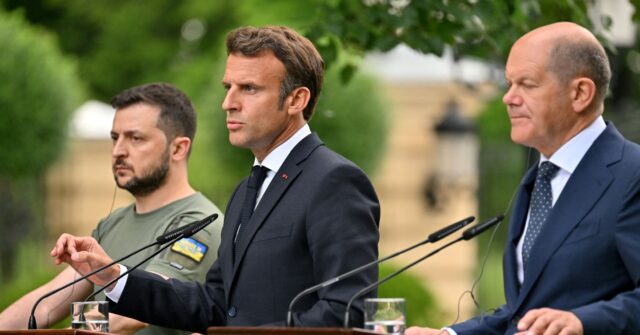


The Trump administration has reportedly called on European nations to outline the number of troops and weapons they are willing to commit to a peacekeeping force in Ukraine amid growing complaints from the continent of being sidelined from negotiations.
According to German broadcaster NTV, Washington has told Berlin and other European capitals to complete a questionnaire detailing the strength of their potential military commitments to Ukraine.
The questionnaire reportedly calls on European nations to disclose how many soldiers they would be willing to send to the country as a peacekeeping force, what types of weapon systems they could provide, and what they would expect the United States to continue to provide in the eventuality of a peace settlement between Kyiv and Moscow.
The German broadcaster said that NATO Secretary General Mark Rutte confirmed on the sidelines of the Munich Security Conference that he was aware of the questionnaire.
Although he reportedly said that he had not seen the document personally, Rutte argued that focusing the conversations surrounding a negotiated end to the war would be helpful.
It comes as European leaders, organised by French President Emmanuel Macron, are set to hold an emergency summit in Paris this week to discuss Europe’s role in Ukraine going forward as the Trump administration appears intent on conducting negotiations between Ukraine and Russia without the Europeans at the table.
Keith Kellogg, the US Special Presidential Envoy for Ukraine and Russia, argued at the Munich Security Conference that previous negotiations had failed because too many voices were involved, citing the Minsk II agreement in 2015 that failed to create a lasting peace between the two countries.
Kellog said that talks would have to be between Ukraine and Russia, with America as a mediator. He said that Europe’s views will be considered; however, having an actual seat in negotiations will likely not happen.
“That is not going to happen. And to my European friends, I would say – get into the debate, not by complaining that you might, yes or no, be at the table, but by coming up with concrete proposals, ideas, ramp up [defence] spending,” he said.
“It may be like chalk on the blackboard, it may grate a little bit, but I am telling you something that is really quite honest,” Kellog added.
It comes amid ongoing discussions about a potential pan-European military force being deployed to Ukraine to act as a buffer against further Russian invasions in lieu of granting the former Soviet state NATO membership or American troops on the ground.
Although many NATO states in Europe have ramped up defence spending in the wake of the Russian invasion, supporting a large standing force in Ukraine would likely require significantly more spending and potentially cuts to the generous welfare programmes long enjoyed throughout the continent as America subsidised their defence.
At the Munich Security Conference, Ukrainian President Volodymyr Zelensky suggested the creation of an “Armed Forces of Europe,” noting the shifting sentiment in the United States against serving as the sole guarantor of Europe’s security.
